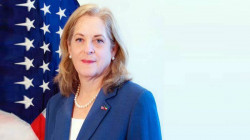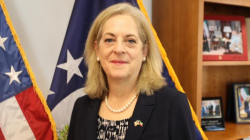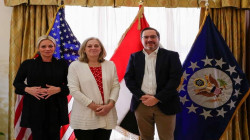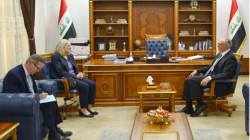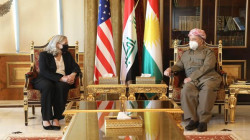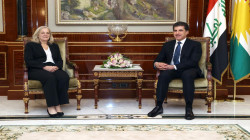Charting the course for Iraq: U.S. ambassador on strategic alliances, economic evolution and counterterrorism endeavors
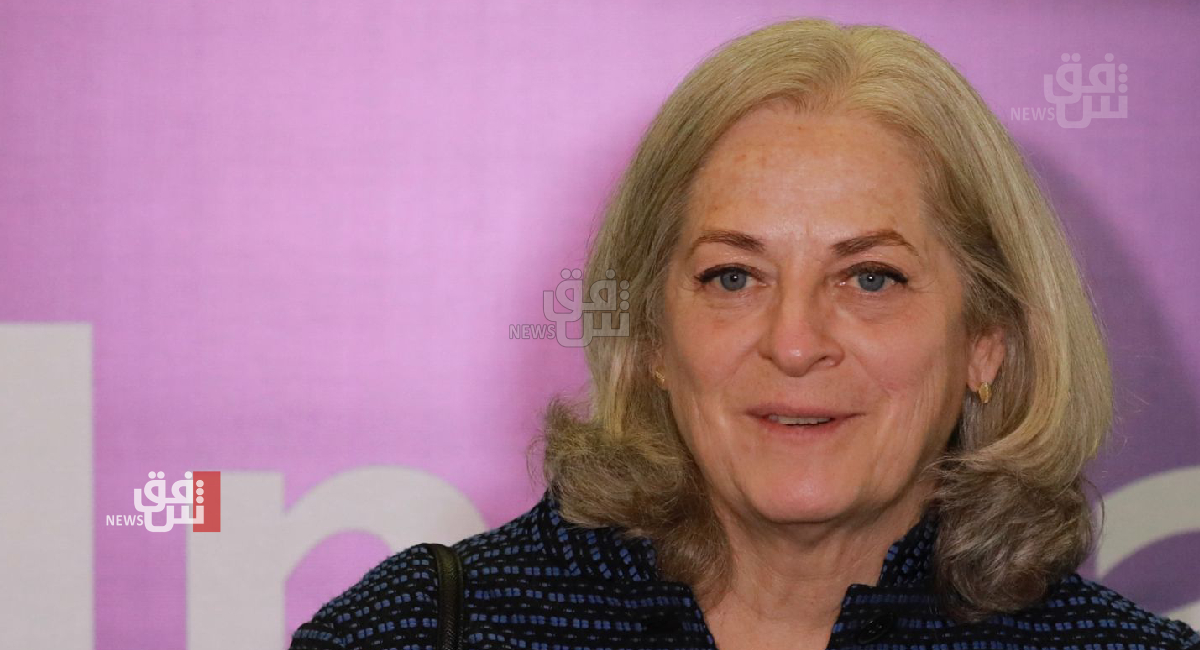
Shafaq News / In the midst of a complex crisis, Alina Romanowski, the U.S. Ambassador in Baghdad, has emphatically implored the Kurdistan Region to maintain the integrity of their democratic processes by ensuring that elections remain free and fair. She further stressed the unaltered mission of U.S. forces in Iraq, which is to support and guide Iraqi forces in their staunch battle against the menace of terrorism.
The ambassador also took the opportunity to reiterate Washington's commitment to a cooperative relationship with al-Sudani's administration. She identified a mutual recognition of the importance of Iraq's energy independence as a significant shared value between them.
In an exclusive interview with Shafaq News Agency, Romanowski delved into a multitude of pressing issues pertaining to Iraq and the nuanced relationship between Baghdad and Washington. She voiced her optimism about a shifting paradigm in Iraq, articulating the American viewpoint on the situation in Kurdistan and the concurrent crises in Sinjar and surrounding the instability of exchange rates.
Romanowski asserted that the policies implemented by Washington were designed with the intention to bolster the Iraqi banking system, promote transparency, and actively combat corruption. Contrary to the prevailing narrative, she refuted the idea that these measures were responsible for the dollar crisis, instead presenting them as strategies aimed at fostering improvement.
In response to queries about Washington's perception of al-Sudani's government amidst allegations of it being associated with Tehran-affiliated "armed factions", Ambassador Romanowski articulated, "We find ourselves gratified by the degree of cooperation we have fostered with PM al-Sudani and his government. We are actively synergizing our efforts to bolster the U.S.-Iraq strategic partnership to its maximum potential, particularly in the realm of cooperation across a broad spectrum of interests integral to the future of ordinary Iraqis."
She further elucidated that the United States and the Iraqi prime minister shared consensus on many critical issues. "We are in agreement that Iraq must strive towards achieving energy independence, stimulate private sector growth, enhance public services, and guarantee the enduring defeat of ISIS. Our primary focal points comprise strengthening our bilateral relations, combating corruption, and addressing the pressing environmental crisis in Iraq."
"I was privileged to be present at the launch of the U.S.-funded Online Single Window project on May 30," the ambassador recalled. "This initiative facilitates easy and transparent online registration for new Iraqi and foreign businesses, obviating the need for visits to multiple offices, paper documentation, and thereby eliminating potential opportunities for corruption. Additionally, the Director of USAID’s Office of Transition Initiatives (O.T.I.), who visited Iraq recently, underscored O.T.I.'s commitment to supporting U.S. foreign policy objectives by aiding local partners in fostering peace and democracy."
Ambassador Romanowski went on to share that Iraqi Airways has taken delivery of its newly acquired Boeing 737 Max airliners and announced the imminent arrival of Iraq’s first Boeing 787 Dreamliner in Baghdad.
Highlighting the investment scenario, she remarked, "Iraqi investors are launching popular American franchises in Iraq, including Pinkberry, Burger King, Cinnabon, KFC, and Pizza Hut. The enthusiastic public response we are observing underscores a strong appetite for more, and we are committed to facilitating even more U.S. firms to conduct business here. This was apparent when a large delegation of Iraqi business representatives attended the Franchise Trade Conference in New York last month."
She added that USAID has been supporting Iraqi entrepreneurs by offering business development services to nearly 6,000 entrepreneurs and over 570 small and medium-sized enterprises. The efforts have resulted in facilitating more than $400 million in foreign investment for Iraqi businesses operating in sectors such as health, manufacturing, green energy, and technology.
Looking ahead, she indicated that "a U.S. Chamber of Commerce delegation representing nearly 50 U.S. businesses will soon visit Baghdad and Erbil to investigate future investment opportunities, with the aim of reinforcing the Iraqi private sector, generating jobs in Iraq, and further boosting trade."
Summarizing her points, she concluded, "These are just a few among numerous recent instances demonstrating our collaborative efforts and how Iraq and its people stand to gain from our sustained strategic partnership."
In response to a question concerning the intricacies of conducting elections in Kurdistan amidst ongoing attempts by the Region’s President to mitigate the crisis, and the nature of the U.S. message to the political forces in the region, Romanowski emphasized, "The United States backs a robust, resilient, and prosperous Kurdistan firmly rooted within a federal Iraq. We firmly believe this is the optimal approach to guarantee regional stability, enhance security, and deliver better services to the populace of the region."
However, she underscored that "The Kurdistan Region's journey towards a prosperous society necessitates enhanced cooperation among the major political parties there. Consequently, we persistently urge both sides to reconcile their differences. It's ultimately the Kurdish people who bear the brunt of the repercussions when the major parties fail to reach a consensus."
Romanowski confirmed that “the United Nations envoy to Iraq has closely engaged with all parties regarding the issue of Kurdistan’s elections, and we fully back her efforts. Similarly, we advocate for holding parliamentary elections in Kurdistan at the earliest possible opportunity.”
Moreover, she accentuated that “Regular, free, and fair elections are critical in bestowing legitimacy and the mandate of the governed. Even in moments of crisis, the indispensability of holding elections remains paramount, as exemplified by the United States during our Civil War and both World Wars.”
When queried about Washington's stance on the complex Sinjar situation, an area beset with disagreements, challenges in implementing the Sinjar agreement, and vying factions seeking control, Romanowski affirmed that Washington supports "the comprehensive implementation of the 2020 Sinjar Agreement. The United States is providing financial assistance to stabilize Sinjar and facilitate the voluntary return of internally displaced persons to their original habitats. Our aid encompasses refurbishing housing, water infrastructure, streets, equipping schools and hospitals, providing equipment or access to finance to help local entrepreneurs rebuild their businesses, and availing resources to communities to assist returnees and support to returnees for self-sustenance and family support."
The ambassador highlighted that "the Government of Iraq plays a pivotal role in determining whether the Sinjar agreement achieves its intended objectives. The United States, in turn, will persist in assisting with the implementation of the agreement. By nominating a district administrator in Sinjar, deploying a 2,500-member security force comprising Sinjar locals, and mitigating the presence of militias in Sinjar, both the federal government in Iraq and the Kurdistan Regional Government (K.R.G.) can positively contribute to facilitating the return of internally displaced individuals." She confirmed that "the much-needed stability for returnees is compromised by the presence of such groups."
Romanowski observed that the Yazidi communities, who constitute the majority of Sinjar's population and Iraq's largest group in humanitarian camps, should be integral to this process – a task that should be undertaken by Baghdad and Erbil.
Regarding the potential for Washington to intervene as a mediator between Iraq and certain countries with which it is experiencing discord over the water crisis, Romanowski articulated that “the U.S. is a proponent of constructive dialogue within the region, facilitating conversations about how Iraq and its neighbors can judiciously share and manage this invaluable resource.”
While acknowledging that "a portion of Iraq’s water insecurity is tied to actions by Turkey, Iran, and Syria," she noted that the crisis is also fundamentally connected to "improving Iraq’s infrastructure and water management."
She elaborated that “water insecurity and combating climate change emerged as areas of crucial focus during the U.S.-Iraq Higher Coordinating Committee meeting in Washington in February.”
“Through the U.S. Agency for International Development (USAID), the U.S. supports the government’s commitment to enhancing infrastructure, including water management, given that Iraq’s agricultural sector is the primary consumer of water resources. The U.S. sponsored a delegation of Iraqi officials to travel to the United States last year to gain insights into our best practices regarding water resource management and adapting to water scarcity. Furthermore, we organized a gathering of U.S. and Iraqi scientists in Amman earlier this year to deliberate on potential solutions to challenges associated with water scarcity and suboptimal water usage,” she added.
Romanowski also mentioned that “USAID has provided over 9,000 farmers and end-users with smart energy and irrigation systems, yielding savings of more than 14 million kWh of energy and 17 million liters of water.
“Moreover, USAID has committed more than $150 million to combating water scarcity, thereby extending access to potable water to over 12 million Iraqis. For instance, USAID has rehabilitated nine water treatment units in Basra, along with water facilities in Nineveh and al-Anbar. In Mosul specifically, USAID installed eight new water pumps in a pump station building and carried out extensive repairs, consequently enhancing the water supply for over 400,000 people across 30 neighborhoods.”
When queried about Washington's prerequisites for a complete military withdrawal from Iraq, Ambassador Romanowski expressed that the Iraqi government has "deemed ISIS to still pose a significant threat to national security, a viewpoint that the U.S. shares, including in regards to the region and the world. Additionally, Prime Minister al-Sudani has publicly endorsed this stance in several statements, including during his meeting with U.S. Secretary of Defense, Lloyd Austin."
"The Iraqi Prime Minister and the United States are in alignment; the battle against ISIS is not yet over," she affirmed.
She further elaborated, “Achieving meaningful progress requires security, which in turn necessitates the permanent defeat of ISIS. This is a salient point for those who may not be closely following the fight against ISIS: the primary force leading the counter-ISIS effort here in Iraq is the Iraqi security forces.”
“The Global Coalition and the U.S. remain in Iraq at the invitation of the Iraqi government, with the primary role of providing advice, assistance, and support to the Iraqi security forces in order to ensure the lasting defeat of ISIS. Our activities are closely aligned with the development of the capabilities of the Iraqi security forces.”
In light of this, Romanowski confirmed that “Under the aegis of the Defeat-ISIS Coalition, the U.S. is steadfast in our commitment to working in conjunction with Iraq and our international partners to counteract the financing, propaganda, and recruitment of foreign terrorist fighters by ISIS.”
“U.S. Secretary of State Antony Blinken and the Iraqi Deputy Prime Minister and Foreign Minister Fuad Hussein will both be attending the Defeat-ISIS ministerial conference in Riyadh, to appraise the progress made thus far and to deliberate on our continued counter-terrorism partnership.”
In relation to the dollar exchange crisis, and the previously stated U.S. position that Washington is not involved in this matter, Romanowski reframed the issue, stating she wouldn't categorize it as a crisis, but clarified, "I have always maintained that we do not control the exchange rate, not that the U.S. is entirely unrelated to this matter."
She further elucidated, “A more accurate characterization of the issue would be as an unintended consequence of an economy transitioning away from cash-based transactions. The U.S. supports the efforts of the Iraqi government and the Central Bank of Iraq (C.B.I.) to combat corruption and money laundering. The curtailment of these activities has led to positive reforms in Iraq’s banking sector, including increased utilization of banks and financial institutions by businesses, which has in turn narrowed the gap between the official and unofficial exchange rates.”
Romanowski further elaborated, “In the past, some businesses and corrupt entities exploited fraudulent documentation and grouped requests to transfer funds abroad under false pretenses. Now that this practice has been curtailed, businesses that seek to access the official dollar rate for the financing of imports must establish bank accounts and obtain the appropriate licensing from the Ministry of Trade.”
Romanowski concluded, “Entities that hoard dollars for currency speculation and companies that continue to import goods without the necessary licensing through cash or informal channels are putting pressure on the parallel exchange rate. We urge all to transition to transactions within the formal banking sector and reduce the demand on cash markets.”
In response to speculations and analyses suggesting 2023 as the year marking a shift in the governmental system in Iraq, or at least a modification to its current structure, Ambassador Romanowski stated, “That is a matter for the Iraqi people to decide. My primary objective is to enhance the U.S.-Iraq Strategic Framework Agreement established in 2008, moving beyond security to a comprehensive relationship that yields tangible results for the Iraqi populace.”
She elaborated, “The U.S. will persist in its partnership with the Iraqi government to amplify our collaboration on shared objectives: building Iraq's energy autonomy, bolstering the private sector, enhancing public services, expanding interpersonal connections, combating corruption, addressing the climate crisis, and fortifying Iraqi security, stability, and sovereignty.”
Ambassador Romanowski also referenced the Economic-focused Higher Coordinating Committee meeting held earlier this year in Washington, D.C., during which Foreign Minister Fuad Hussein and advisors to Prime Minister al-Sudani outlined a strategy to transition Iraq’s economy from an oil revenue and public sector job reliance to a country with robust private industries, where the private sector predominantly drives economic growth. “We also explored how the U.S. could aid Iraq’s efforts to attain energy self-reliance and foster alternate energy sources among its neighbors.”
She concluded, “My responsibility as an ambassador is to guide the Embassy’s efforts to be forward-thinking and identify opportunities where we can cooperate with Iraq and its people. Iraq is undergoing a transformation, and I am optimistic about our shared future.”
